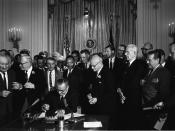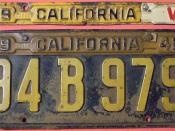Affirmative Action -An Equal Society?
Affirmative action is policy created to remedy past discrimination by increasing opportunities for minorities. From affirmative action's introduction in 1969, to the recent abolishment of it in the states of California and Washington, affirmative action has dominated many hiring practices, promotions, and processes of college admissions. With lawmakers, the courts, and the public divided over the issue, and attempts by all to change current policies, the legitimacy and the future of affirmative action remain uncertain.
President Lyndon B. Johnson was the first to establish policies that assisted minorities. In a 1965 commencement address at Howard University, he said:
You do not take a person who for years has been hobbled by chains and liberate him, bring him up to the starting line of a race and then say, "you're free to compete with all the others," and still justly believe that you have been completely fair.
Thus it is not enough just to open the gates of opportunity.
The original goal of the civil rights movement had been to have every man equal under the law, but just having read what Lydon B. Johnson said, it is obvious that simply ending the discrimination that had occurred for so long did not go far enough for some people.
The first to execute policies that guaranteed minority hiring was Richard Nixon. In response to racial inequalities in the workforce, Nixon created the Philadelphia Plan, which required contractors to set specific goals for hiring minorities. Such treatment required that attention be paid to the criteria of race, sex, and ethnicity that had been previously prohibited. The Civil Rights Act of 1964, Title VI declared:
No person in the United States shall, on the ground of race, color, or national origin, be excluded from participation in, be denied the...


